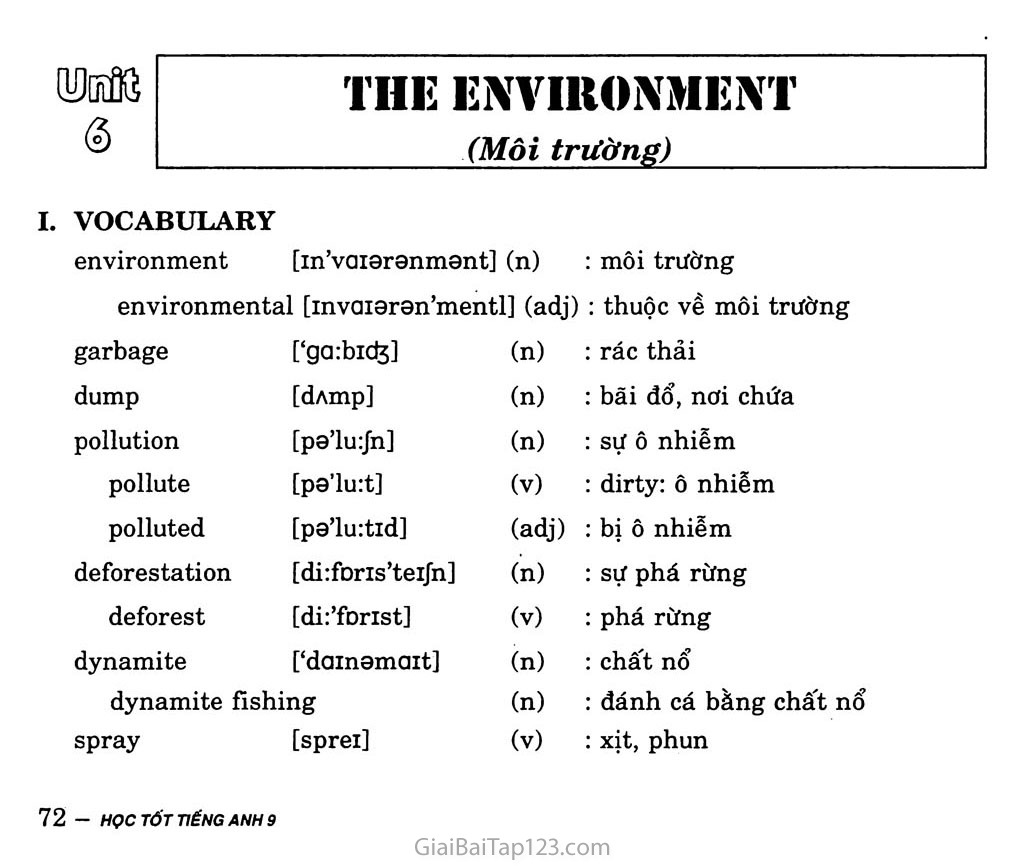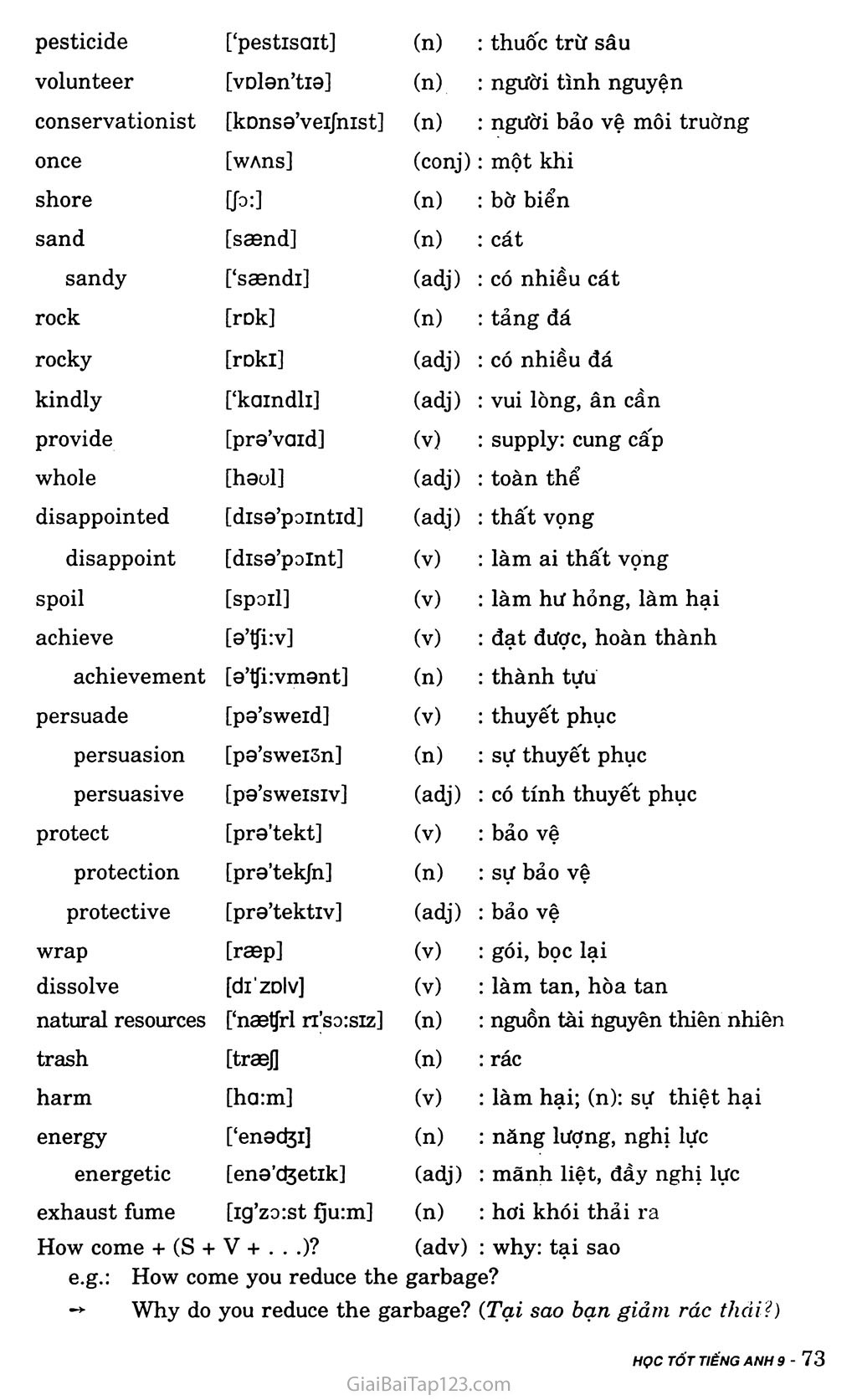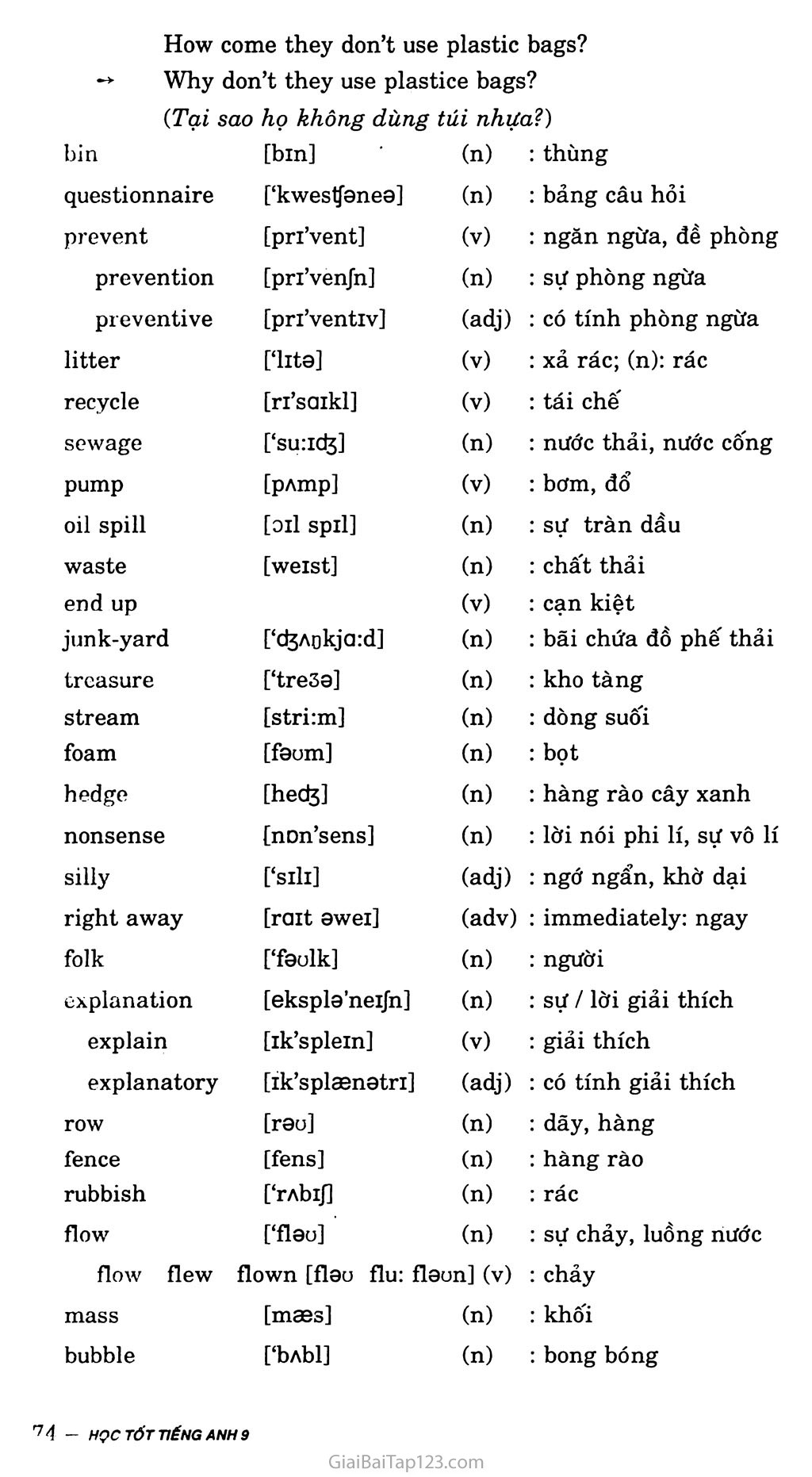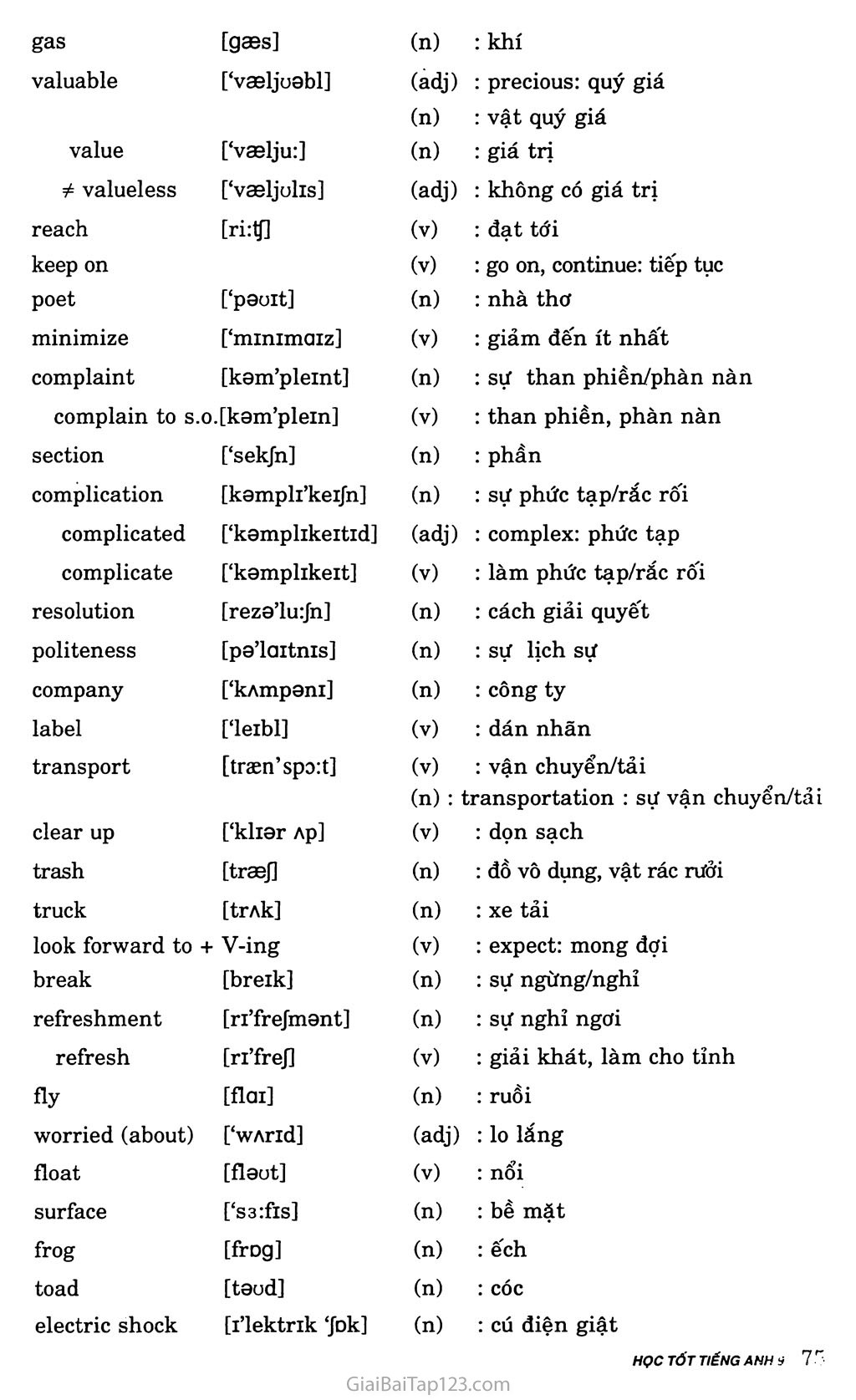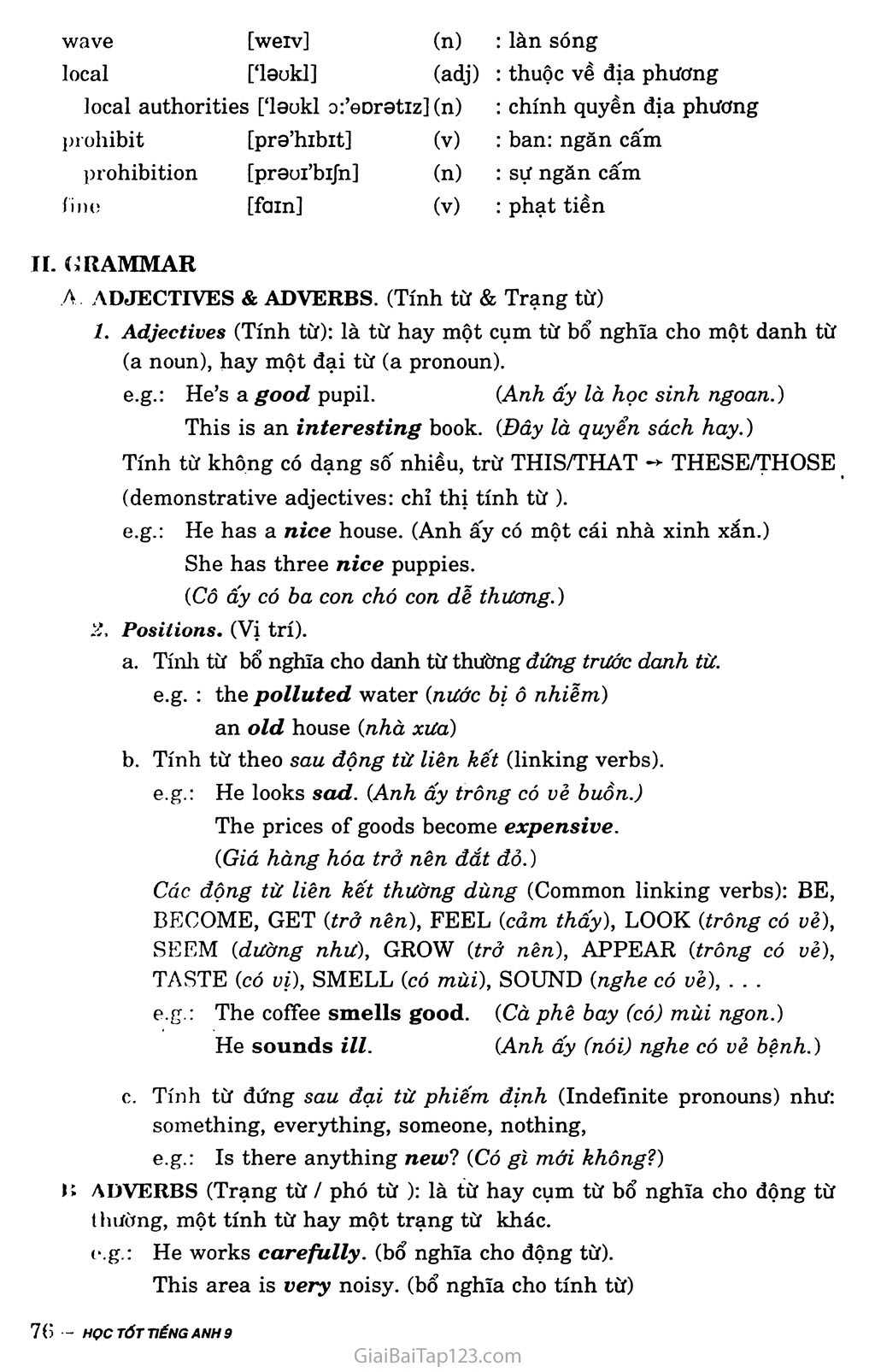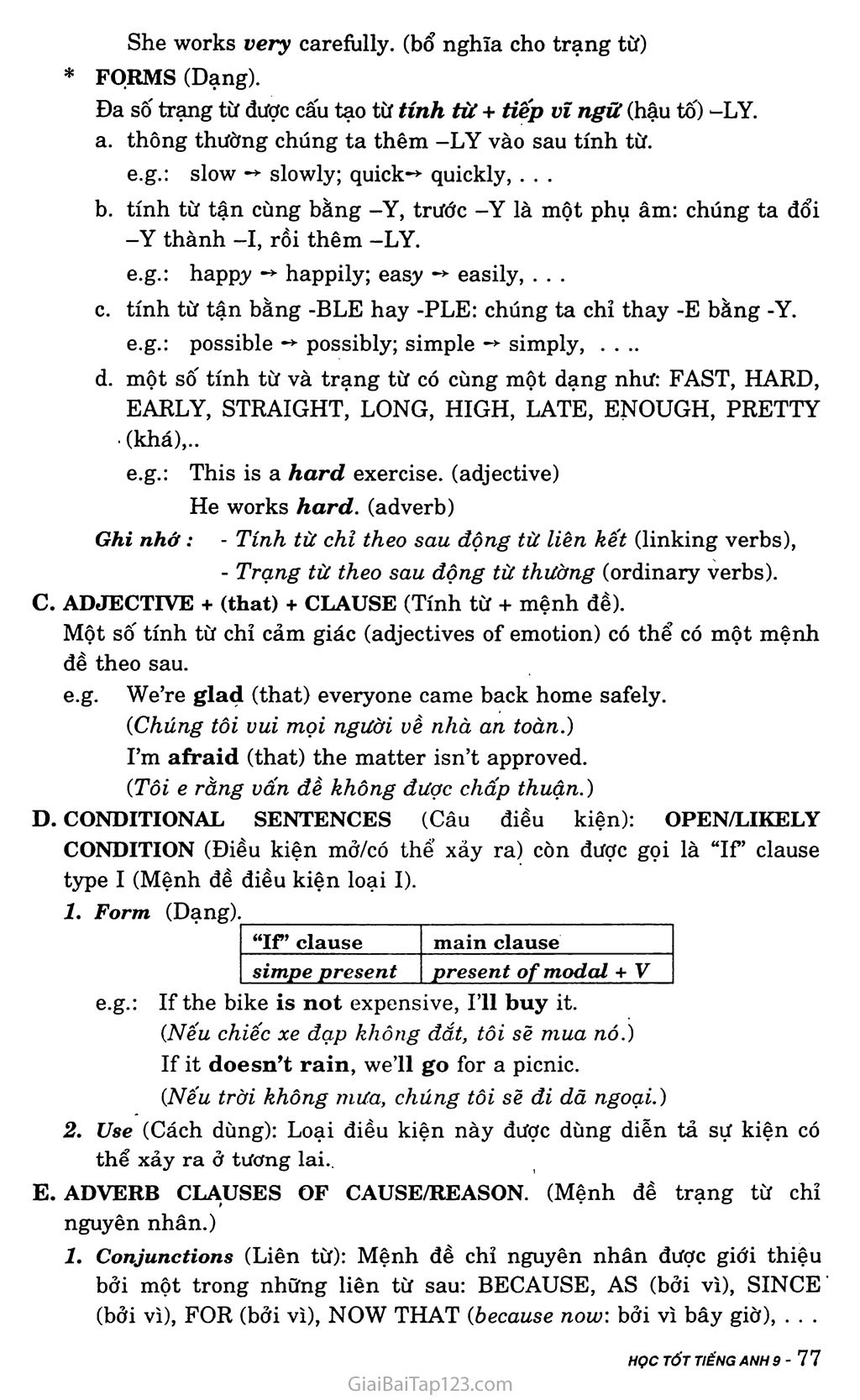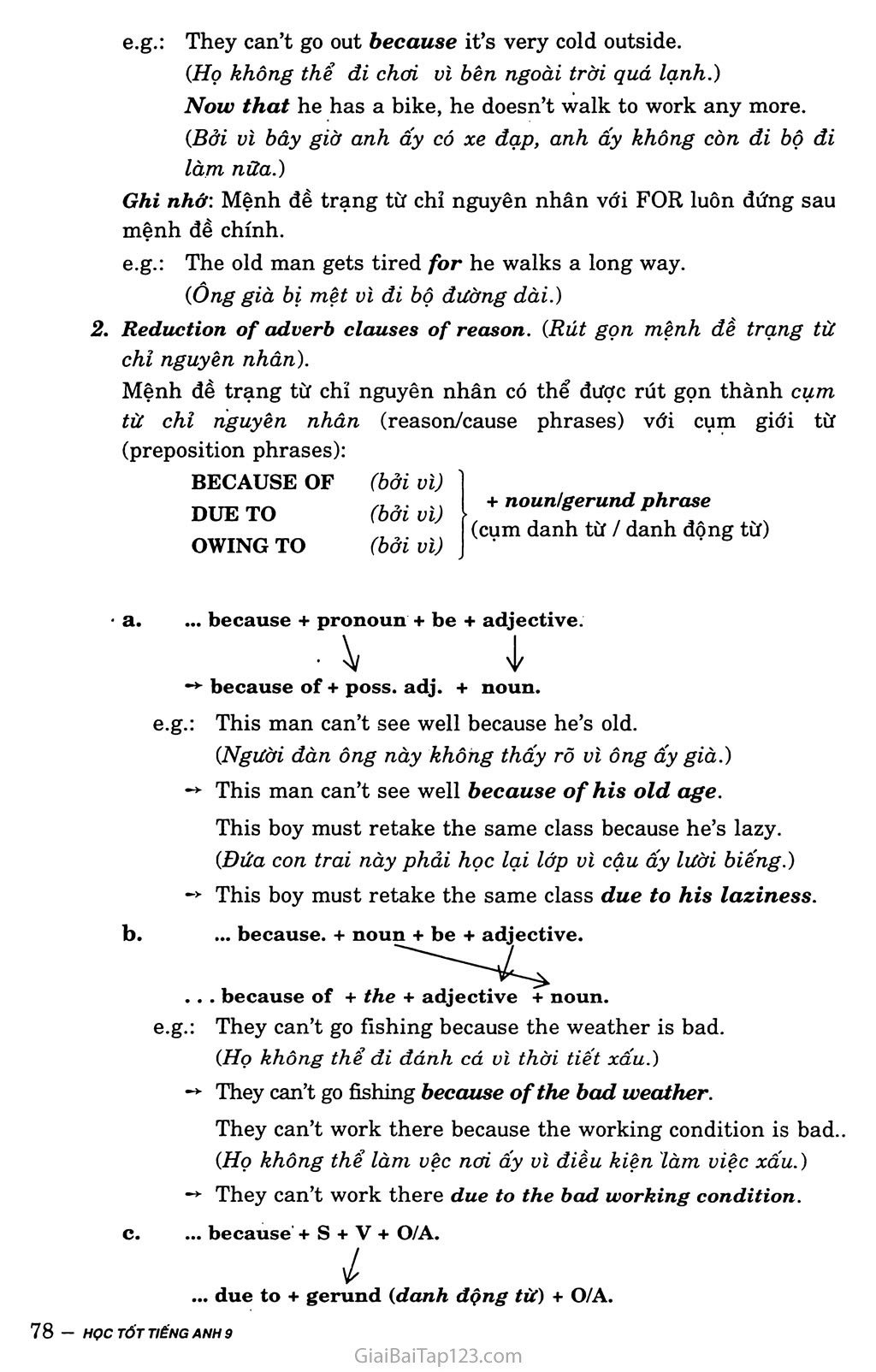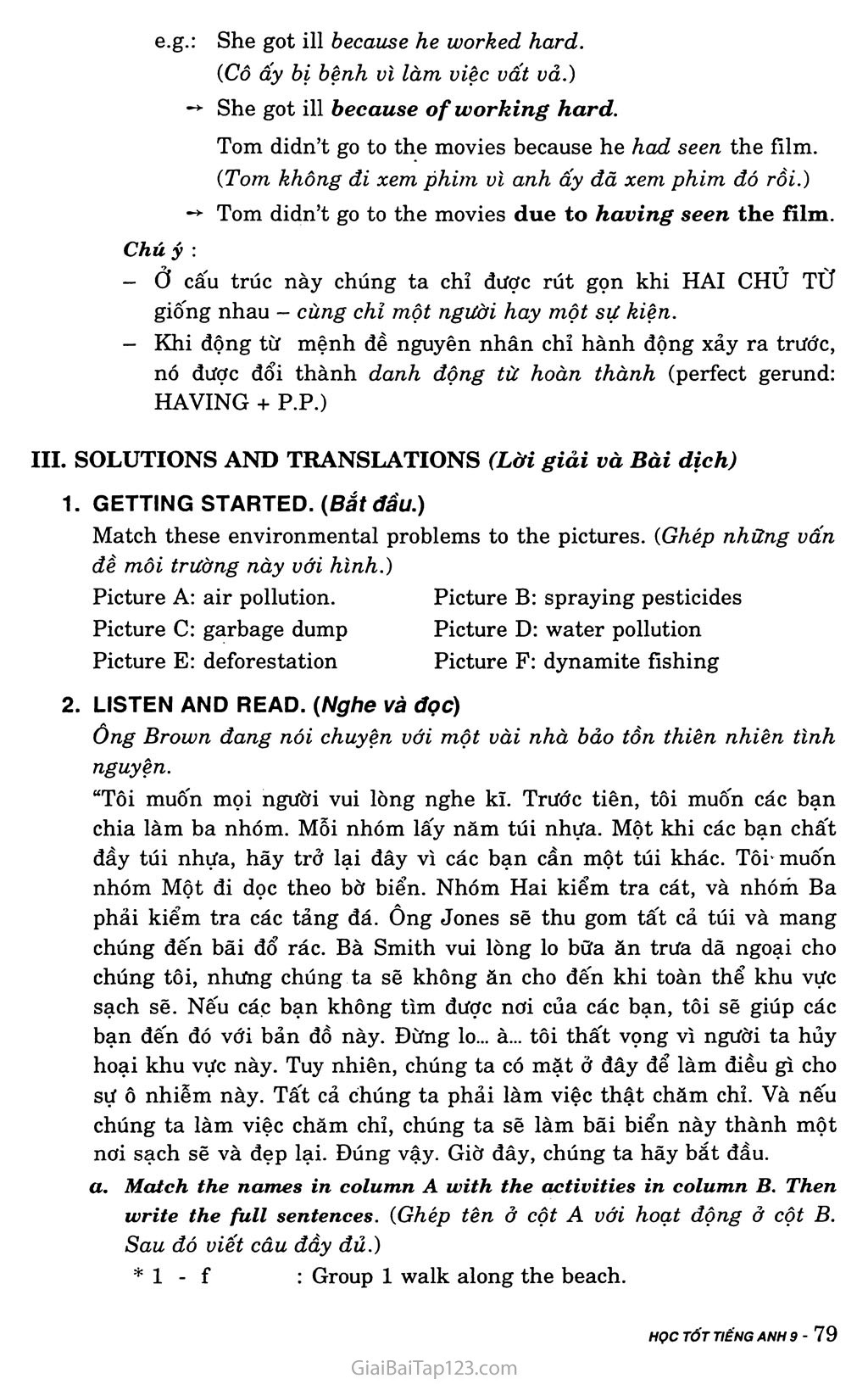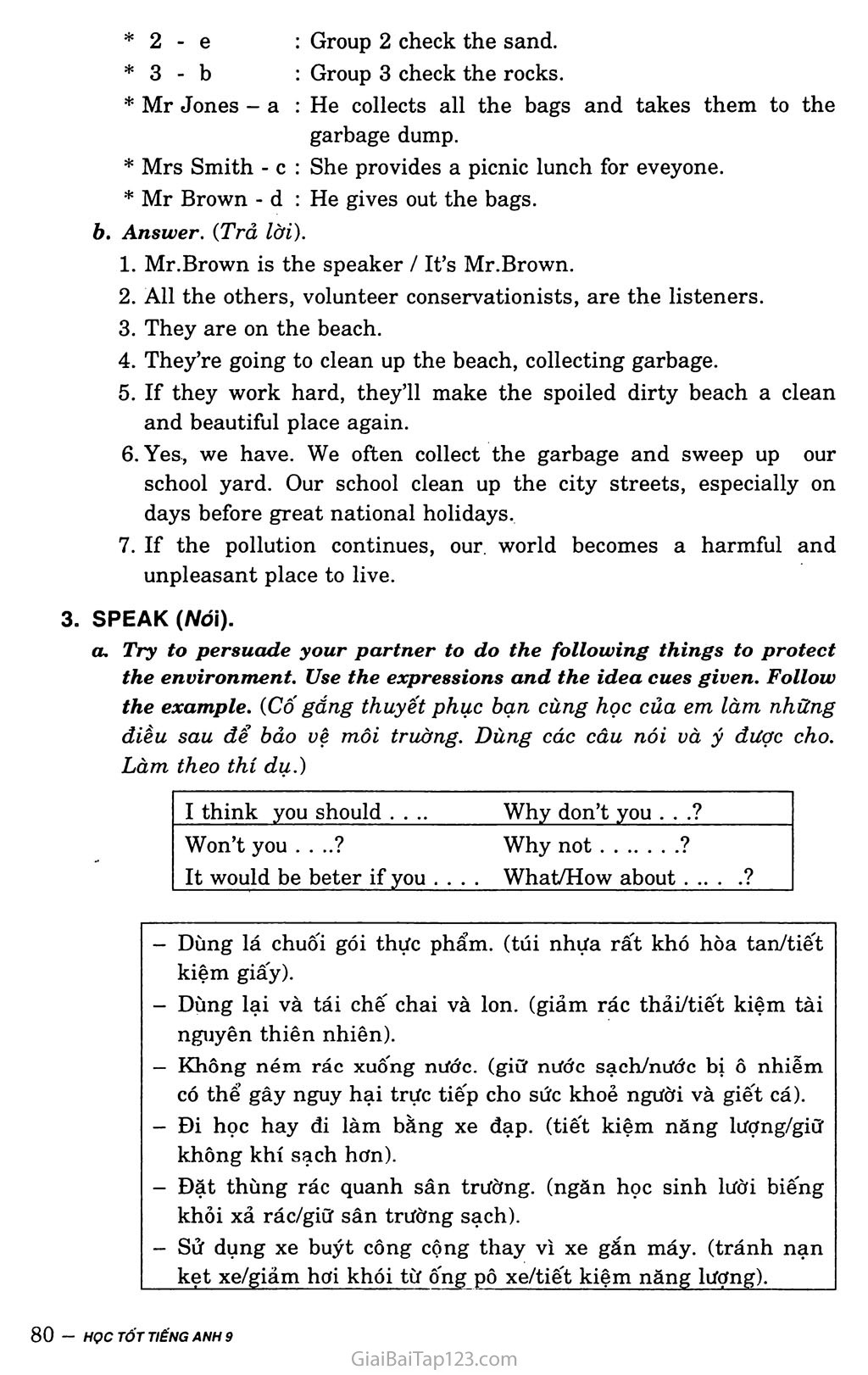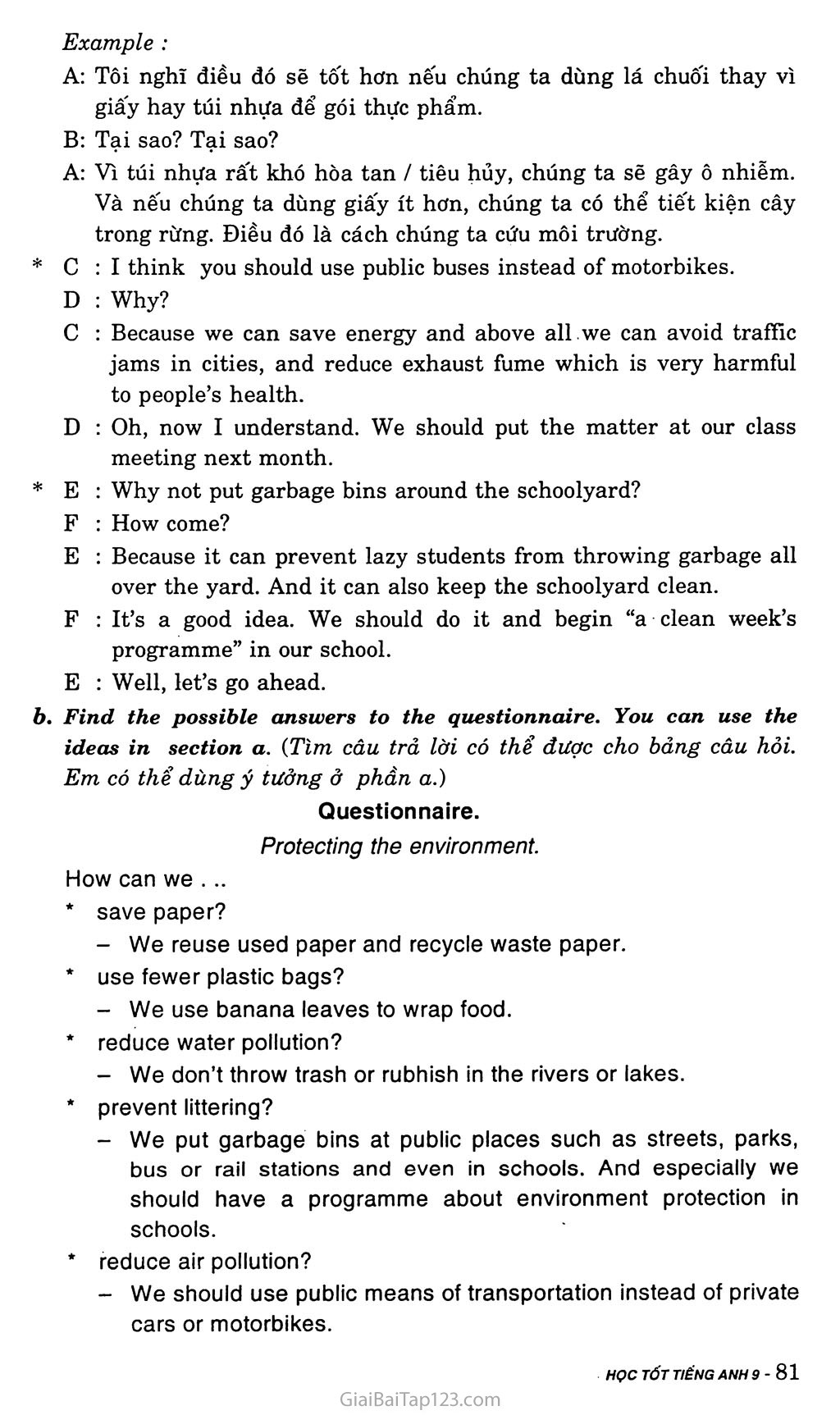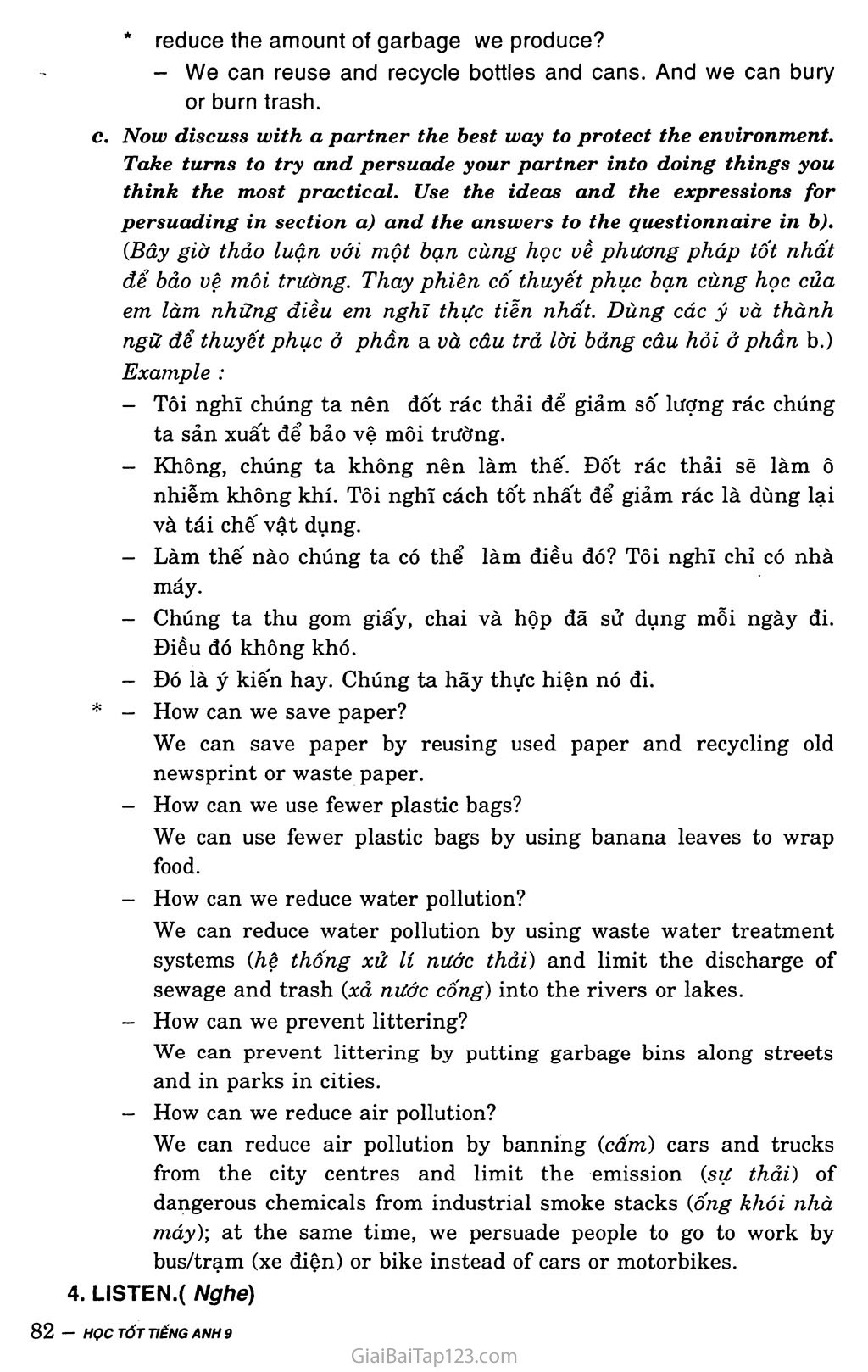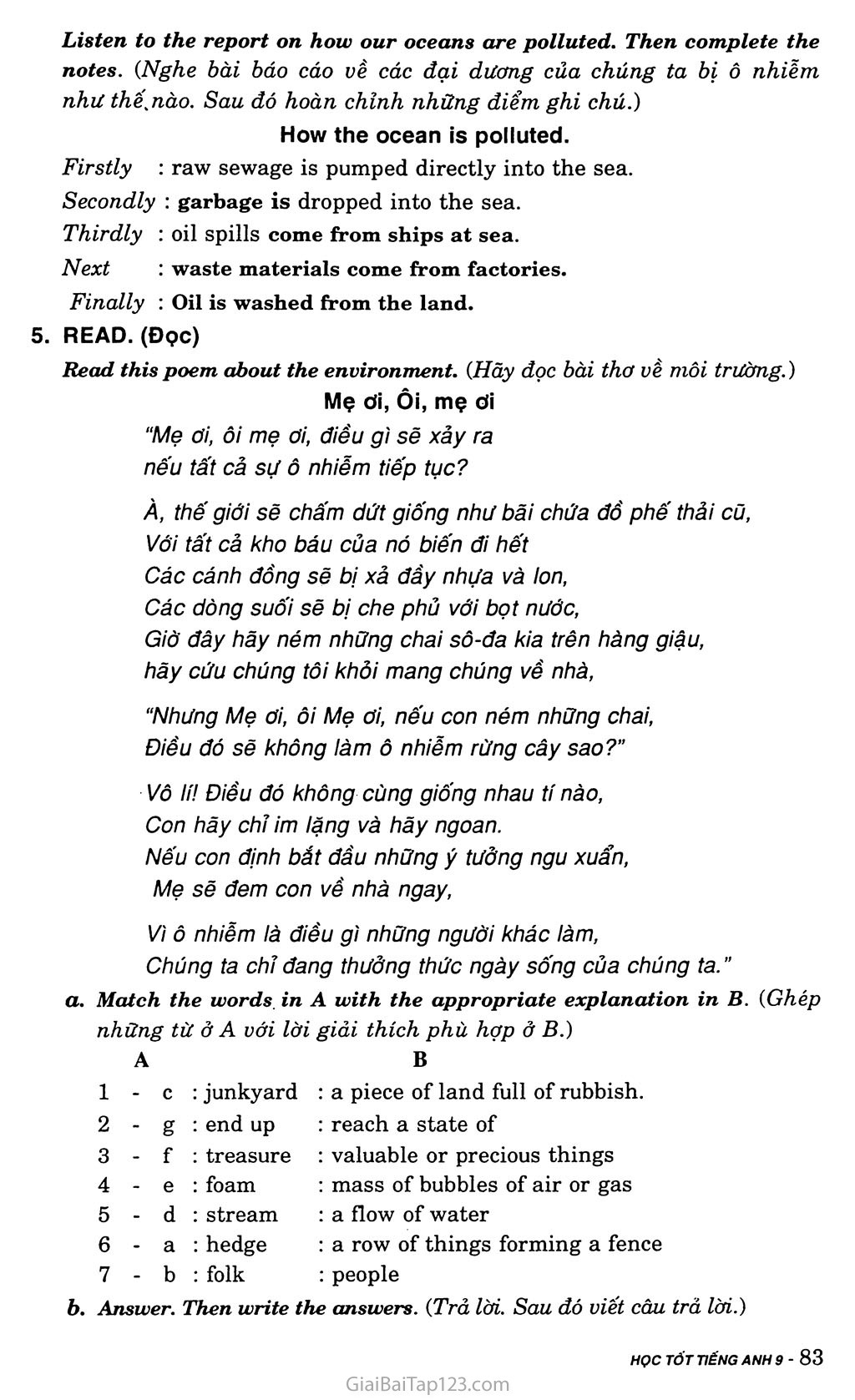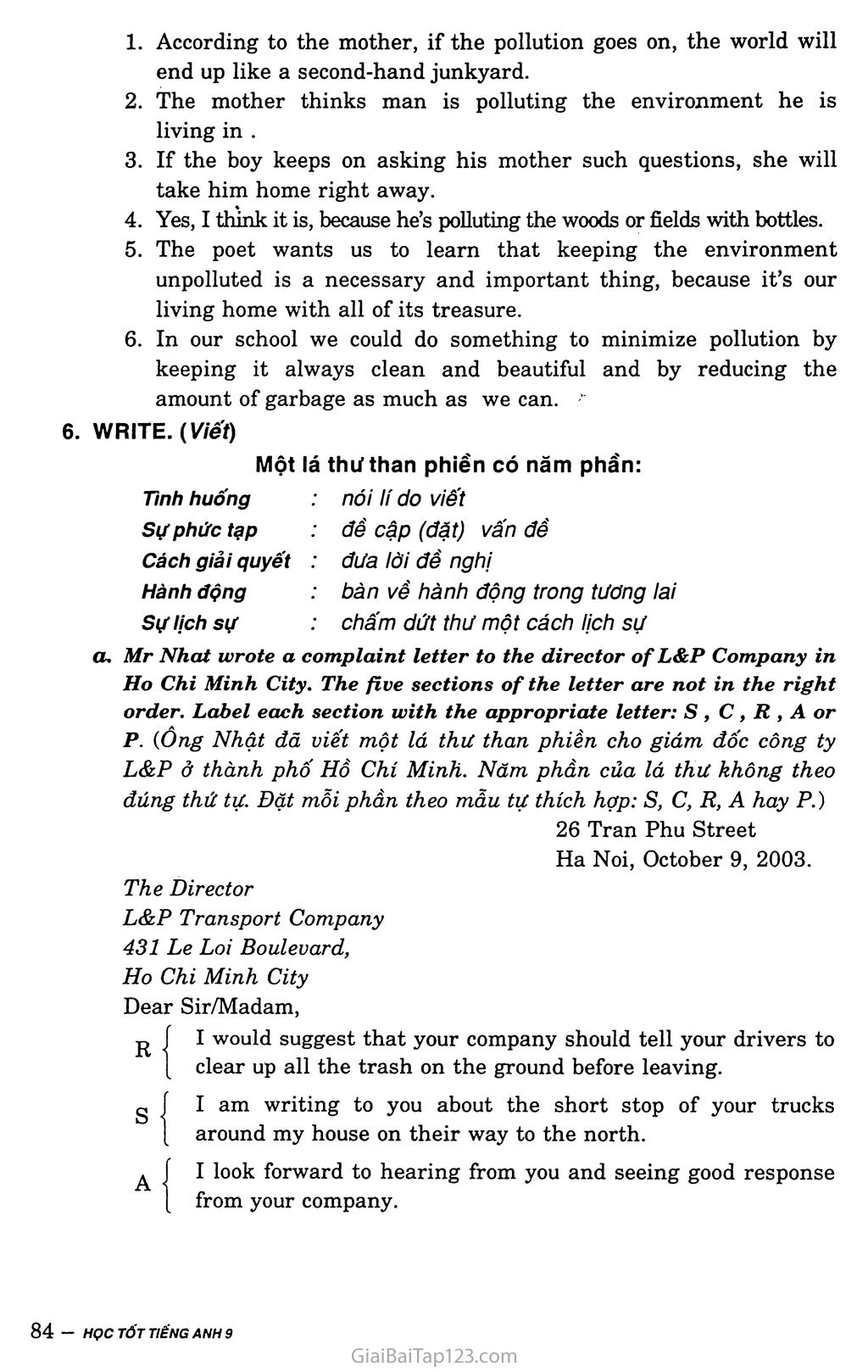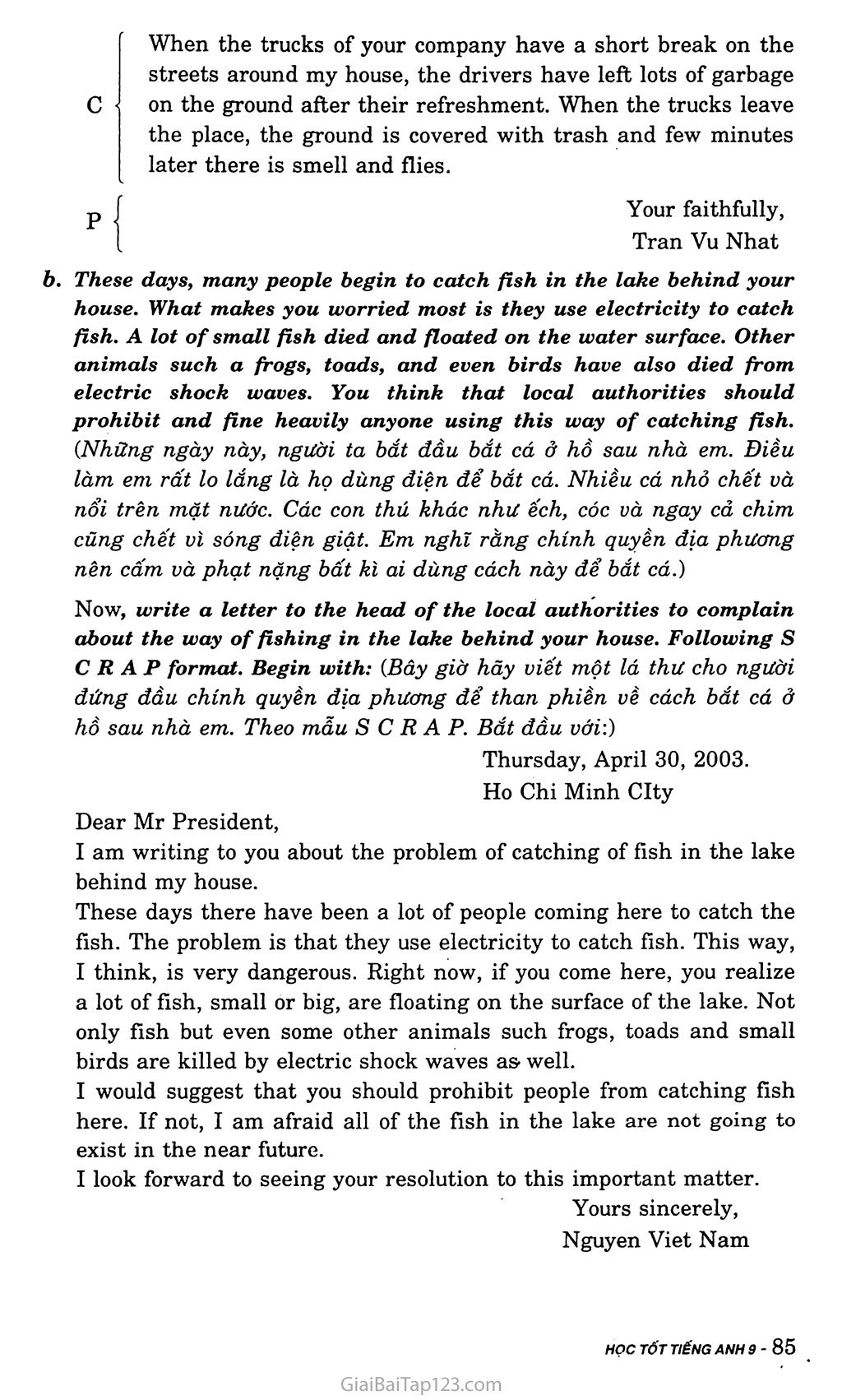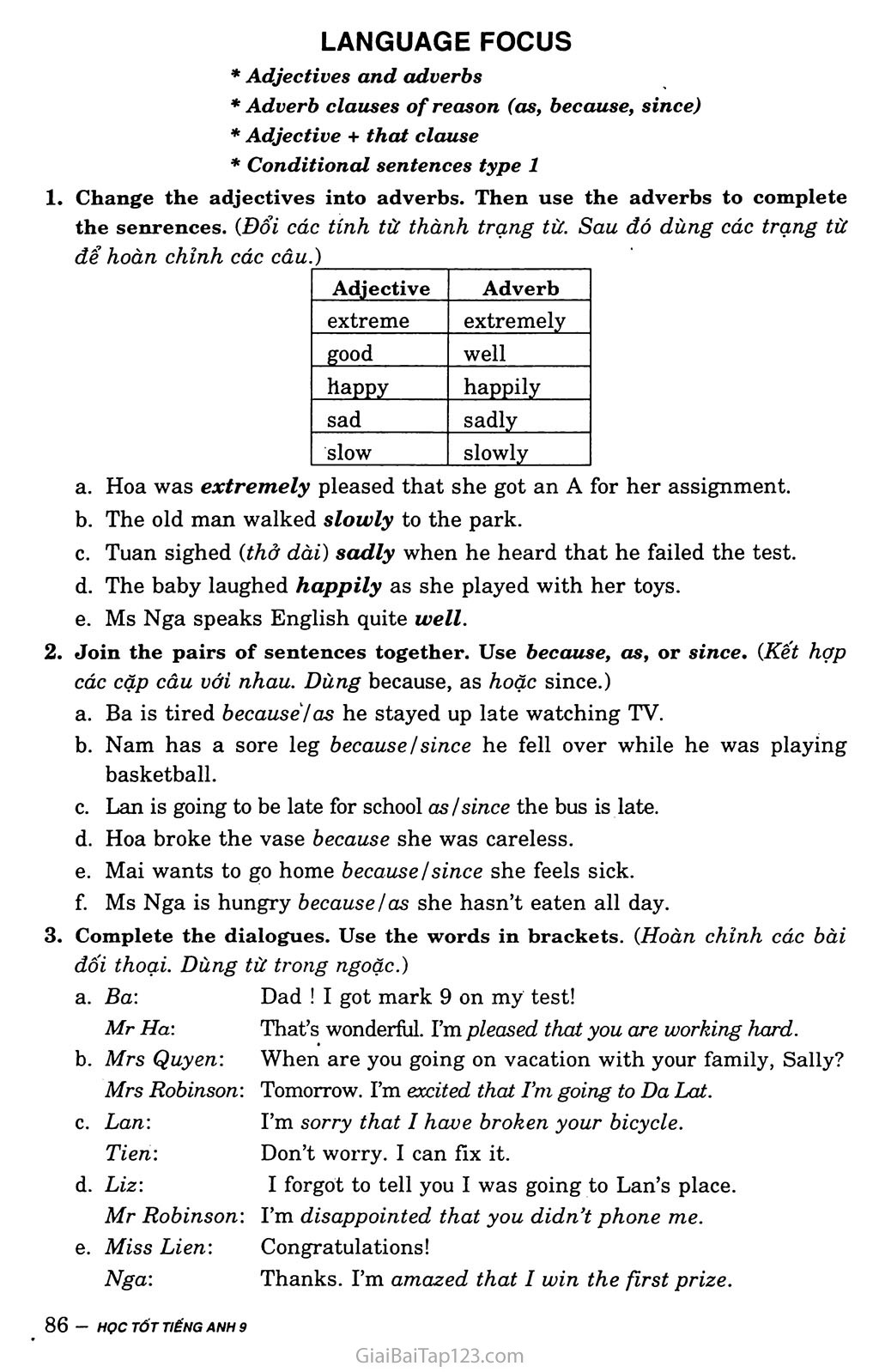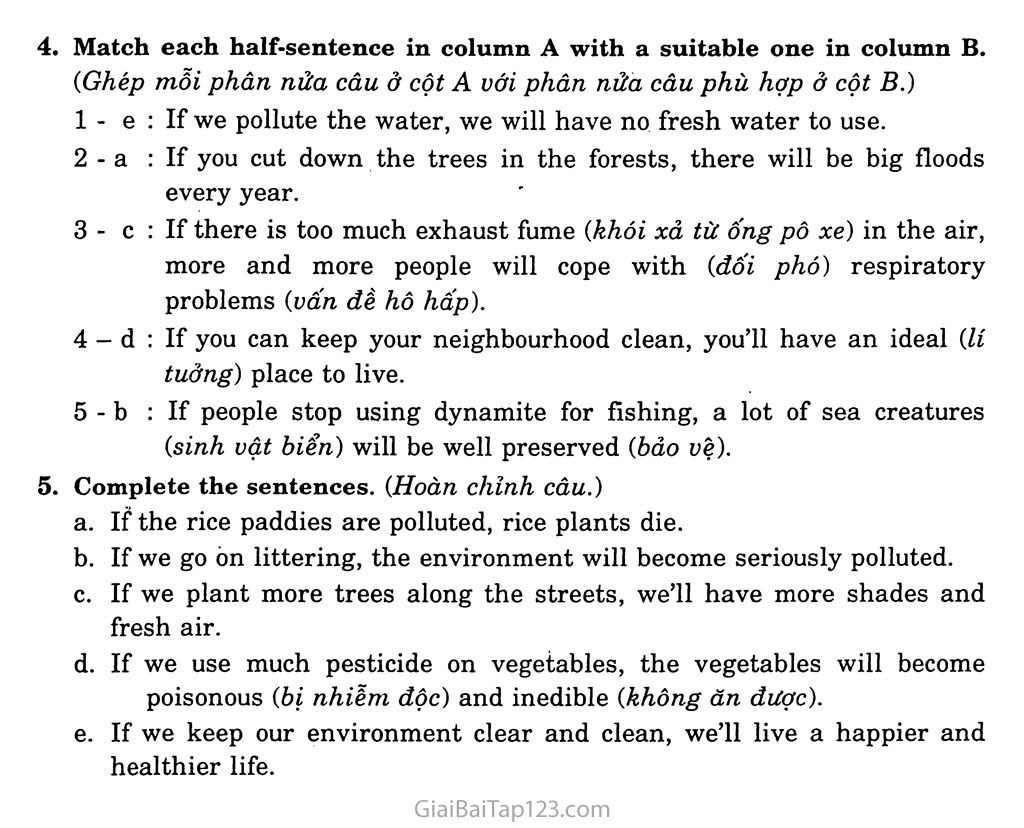Giải tiếng Anh lớp 9 Unit 6: The Environment
THE ENVIRONMENT
(Môi trường)
VOCABULARY
environment [in’vaisrsnment] (n) : môi trường
environmental [invaiaran’mentl] (adj) : thuộc về môi trường
garbage
[‘ga.-bidj]
(n)
: rác thải
dump
[dAmp]
(n)
: bãi đổ, nơi chứa
pollution
[pa’lu:Jn]
(n)
: sự ô nhiễm
pollute
[pa’lu:t]
(V)
: dirty: ô nhiễm
polluted
[ps’lurtid]
(adj)
: bị ô nhiễm
deforestation
[di:fDris’teiJn]
(n)
: sự phá rừng
deforest
[diffDrist]
(v)
: phá rừng
dynamite
[‘dainamait]
(n)
: châ't nổ
dynamite fishing
(n)
: đánh cá bằng chất nổ
spray
[sprei]
(v)
: xịt, phun
pesticide
[‘pestisait]
(n)
thuôc trừ sâu
volunteer
[vDlan’tia]
(n)
người tình nguyện
conservationist
[kDnsa’veiJnist]
(n)
người bảo vệ môi truờng
once
[wAns]
(conj)
một khi
shore
[fa:]
(n)
bờ biển
sand
[ssend]
(n)
cát
sandy
[‘ssendi]
(adj)
có nhiều cát
rock
[rDk]
(n)
tảng đá
rocky
[rDkl]
(adj)
có nhiều đá
kindly
fkaindli]
(adj)
vui lòng, ân cần
provide
[pra’vaid]
(v)
supply: cung cấp
whole
[haul]
(adj)
toàn thể
disappointed
[disa’pointid]
(adj)
thất vọng
disappoint
[disa’polnt]
(v)
làm ai thất vọng
spoil
[spoil]
(v)
làm hư hỏng, làm hại
achieve
[s’tfi:v]
(v)
đạt được, hoàn thành
achievement
[a’tfi:vmant]
(n)
thành tựu
persuade
[pa’sweid]
(v)
thuyết phục
persuasion
[pa’sweiSn]
(n)
sự thuyết phục
persuasive
[pa’sweisiv]
(adj)
có tính thuyết phục
protect
[pra’tekt]
(v)
bảo vệ
protection
[pra’tekfn]
(n)
sự bảo vệ
protective
[pra’tektiv]
(adj)
bảo vệ
wrap
[reap]
(v)
gói, bọc lại
dissolve
[dl'ZDlv]
(v)
làm tan, hòa tan
natural resources
[‘naetfrl n’so:siz]
(n)
nguồn tài nguyên thiên nhiên
trash
[trasj]
(n)
rác
harm
[ha:m]
(v)
làm hại; (n): sự thiệt hại
energy
[‘enadgi]
(n)
năng lượng, nghị lực
energetic
[ena’djetik]
(adj)
mãnh liệt, đầy nghị lực
exhaust fume
[ig’zo:st fju:m]
(n)
hơi khói thải ra
How come + (S + V + . . .)?
(adv)
: why: tại sao
e.g.: How come you reduce the garbage?
■* Why do you reduce the garbage? (Tại sao bạn giảm rác thải?)
How come they don’t use plastic bags? -* Why don’t they use plastice bags?
{Tại sao họ không dùng túi nhựa?)
bin
[bin]
(n)
thùng
questionnaire
[‘kwestjanea]
(n)
bảng câu hỏi
prevent
[pri’vent]
(v)
ngăn ngừa, đề phòng
prevention
[pri’venjn]
(n)
sự phòng ngừa
preventive
[pri’ventiv]
(adj)
có tính phòng ngừa
litter
[‘lita]
(v)
xả rác; (n): rác
recycle
[ri’saikl]
(v)
tái chế
sewage
[‘suridj]
(n)
nước thải, nước công
pump
[pAmp]
(v)
bơm, đổ
oil spill
[oil spil]
(n)
sự tràn dầu
waste
[weist]
(n)
chất thải
end up
(v)
cạn kiệt
junk-yard
[‘d3ADkja:d]
(n)
bãi chứa đồ phế thải
treasure
[‘tre39]
(n)
kho tàng
stream
[stri:m]
(n)
dòng suôi
foam
[faum]
(n)
bọt
hedge
[hecfe]
(n)
hàng rào cây xanh
nonsense
[nDn’sens]
(n)
lời nói phi lí, sự vô lí
silly
[‘sill]
(adj)
ngớ ngẩn, khờ dại
right away
[rait awei]
(adv)
immediately: ngay
folk
[‘faulk]
(n)
người
explanation
[ekspla’neijn]
(n)
sự / lời giải thích
explain
[ik’splein]
(v)
giải thích
explanatory
[ik’splaenatri]
(adj)
có tính giải thích
row
[rao]
(n)
dãy, hàng
fence
[fens]
(n)
hàng rào
rubbish
[‘rAbiJ]
(n)
rác
flow
[‘flao] '
(n)
sự chảy, luồng nước
flow flew
flown [flao flu: flaun] (v)
chảy
mass
[mass]
(n)
khôi
bubble
[‘bAbl]
(n)
bong bóng
gas
[gaes]
(n)
: khí
valuable
[‘vasljuabl]
(adj)
(n)
: precious: quý giá : vật quý giá
value
[‘vaelju:]
(n)
: giá trị
# valueless
[‘vseljolis]
(adj)
: không có giá trị
reach
[ri:tf]
(v)
: đạt tới
keep on
(v)
: go on, continue: tiếp tục
poet
[‘paoit]
(n)
: nhà thơ
minimize
[‘mimmaiz]
(v)
: giảm đến ít nhất
complaint
[kam’pleint]
(n)
: sự than phiền/phàn nàn
complain to s.o
.[kam’plein]
(v)
: than phiền, phàn nàn
section
[‘sekfn]
(n)
: phần
complication
[kampli’keijn]
(n)
: sự phức tạp/rắc rối
complicated
[‘kamplikeitid]
(adj)
: complex: phức tạp
complicate
[‘kamplikeit]
(v)
: làm phức tạp/rắc rốì
resolution
[reza’lu:Jn]
(n)
: cách giải quyết
politeness
[pa’laitms]
(n)
: sự lịch sự
company
[‘kAmpani]
(n)
: công ty
label
[‘leibl]
(v)
: dán nhãn
transport
[traen’spod]
(v)
(n):
: vận chuyển/tải
transportation : sự vận chuyển/tải
clear up
[‘kliar Ap]
(v)
: dọn sạch
trash
[traej]
(n)
: đồ vô dụng, vật rác rưởi
truck
[trAk]
(n)
: xe tải
look forward to + V-ing
(v)
: expect: mong đợi
break
[breik]
(n)
: sự ngừng/nghỉ
refreshment
[ri’frejmant]
(n)
: sự nghỉ ngơi
refresh
[ri’frej]
(v)
: giải khát, làm cho tỉnh
fly
[flai]
(n)
: ruồi
worried (about)
[‘wArid]
(adj)
: lo lắng
float
[flaot]
(v)
: nổi
surface
[‘s3:fis]
(n)
: bề mặt
frog
[frDg]
(n)
: ếch
toad
[taod]
(n)
: cóc
electric shock
[I’lektrik ‘Jbk]
(n)
: cú điện giật
wave
[weiv]
(n)
: làn sóng
local
[‘lsukl]
(adj)
: thuộc về địa phương
local authorities [‘laukl o:’eDratiz](n)
: chính quyền địa phương
prohibit
[prs’hibit]
(v)
: ban: ngăn cấm
prohibition
[prsui’bi/n]
(n)
: sự ngăn cấm
line
[fain]
(v)
: phạt tiền
II. GRAMMAR
A ADJECTIVES & ADVERBS. (Tính từ & Trạng từ)
í. Adjectives (Tính từ): là từ hay một cụm từ bổ nghĩa cho một danh từ
(a noun), hay một đại từ (a pronoun).
e.g.: He’s a good pupil. (Anh ấy là học sinh ngoan.)
This is an interesting book. (Đây là quyển sách hay.)
Tính từ không có dạng sô' nhiều, trừ THIS/THAT •* THESE/THOSE
(demonstrative adjectives: chỉ thị tính từ ).
e.g.: He has a nice house. (Anh ấy có một cái nhà xinh xắn.)
She has three nice puppies.
(Cô ấy có ba con chó con dễ thương.)
Positions. (Vị trí).
Tính từ bổ nghĩa cho danh từ thường đứng trước danh từ. e.g. : the polluted water (nước bị ô nhiễm)
an old house (nhà xưa)
Tính từ theo sau động từ liên kết (linking verbs), e.g.: He looks sad. (Anh ấy trông có vẻ buồn.)
The prices of goods become expensive.
(Giá hàng hóa trở nên đắt đỏ.)
Các động từ liên kết thường dùng (Common linking verbs): BE, BECOME, GET (trở nên), FEEL (cảm thấy), LOOK (trông có vẻ), SEEM (dường như), GROW (trở nên), APPEAR (trông có vẻ), TASTE (có vị), SMELL (có mùi), SOUND (nghe có vẻ), . . . e.g.: The coffee smells good. (Cà phê bay (có) mùi ngon.)
He sounds ill. (Anh ấy (nói) nghe có vẻ bệnh.)
Tính từ đứng sau đại từ phiếm định (Indefinite pronouns) như: something, everything, someone, nothing,
e.g.: Is there anything new? (Có gì mới không?)
B ADVERBS (Trạng từ / phó từ ): là từ hay cụm từ bổ nghĩa cho động từ
thường, một tính từ hay một trạng từ khác, e.g.: He works carefully, (bổ nghĩa cho động từ).
This area is very noisy, (bổ nghĩa cho tính từ)
She works very carefully, (bổ nghĩa cho trạng từ)
* FORMS (Dạng).
Đa số trạng từ được cấu tạo từ tính từ + tiếp vĩ ngữ (hậu tố) -LY.
thông thường chúng ta thêm -LY vào sau tính từ. e.g.: slow •* slowly; quick-” quickly, . . .
tính từ tận cùng bằng -Y, trước -Y là một phụ âm: chúng ta đổi -Y thành -I, rồi thêm -LY.
e.g.: happy -* happily; easy -> easily, . . .
tính từ tận bằng -BLE hay -PLE: chúng ta chỉ thay -E bằng -Y. e.g.: possible possibly; simple -* simply, . . ..
một số tính từ và trạng từ có cùng một dạng như: FAST, HARD, EARLY, STRAIGHT, LONG, HIGH, LATE, ENOUGH, PRETTY
• (khá),..
g.: This is a hard exercise, (adjective)
He works hard, (adverb)
Ghi nhớ: - Tính từ chỉ theo sau động từ liên kết (linking verbs),
- Trạng từ theo sau động từ thường (ordinary verbs).
c. ADJECTIVE + (that) + CLAUSE (Tính từ + mệnh đề).
Một số tính từ chỉ cảm giác (adjectives of emotion) có thể có một mệnh đề theo sau.
e.g. We’re glad (that) everyone came back home safely.
(Chúng tôi vui mọi người về nhà an toàn.}
I’m afraid (that) the matter isn’t approved.
(Tôi e rằng vấn đề không được chấp thuận.}
D. CONDITIONAL SENTENCES (Câu điều kiện): OPEN/LIKELY
CONDITION (Điều kiện mở/có thể xảy ra) còn được gọi là “If’ clause type I (Mệnh đề điều kiện loại I).
1. Form (Dạng).
“If’ clause
main clause
simpe present
present of modal + V
e.g.: If the bike is not expensive, I’ll buy it.
(Nếu chiếc xe đạp không đắt, tôi sẽ mua nó.}
If it doesn’t rain, we’ll go for a picnic.
(Nếu trời không mưa, chúng tôi sẽ đi dã ngoại.)
2. Use (Cách dùng): Loại điều kiện này được dùng diễn tả sự kiện có thể xảy ra ở tương lai.
E. ADVERB CLAUSES OF CAUSE/REASON. (Mệnh đề trạng từ chỉ nguyên nhân.)
Conjunctions (Liên từ): Mệnh đề chỉ nguyên nhân được giới thiệu bởi một trong những liên từ sau: BECAUSE, AS (bởi vì), SINCE (bởi vì), FOR (bởi vì), NOW THAT (because now. bởi vì bây giờ), . . .
e.g.: They can’t go out because it’s very cold outside.
{Họ không thể đi chơi vì bên ngoài trời quá lạnh.)
Now that he has a bike, he doesn’t walk to work any more. {Bởi vì bây giờ anh ấy có xe đạp, anh ấy không còn di bộ đi làm nữa.)
Ghi nhớ: Mệnh đề trạng từ chỉ nguyên nhân với FOR luôn đứng sau mệnh đề chính.
e.g.: The old man gets tired for he walks a long way.
2.
{Ong già bị mệt vì đi bộ đường dài.)
Reduction of adverb clauses of reason. {Rút gọn mệnh dề trạng từ chỉ nguyên nhàn).
Mệnh đề trạng từ chỉ nguyên nhân có thể được rút gọn thành cụm từ chỉ nguyên nhân (reason/cause phrases) với cụm giới từ (preposition phrases):
+ noun!gerund phrase (cụm danh từ / danh động từ)
■ a. ... because + pronoun + be + adjective.
• \ .. I
“*■ because of + poss. adj. + noun, e.g.: This man can’t see well because he’s old.
{Người dàn ông này không thấy rõ vì ông ấy già.)
-*■ This man can’t see well because of his old age.
This boy must retake the same class because he’s lazy.
{Đứa con trai này phải học lại lớp vì cậu ấy lười biếng.)
-> This boy must retake the same class due to his laziness.
... because. + noun + be + adjective.
. . . because of + the + adjective + noun, e.g.: They can’t go fishing because the weather is bad.
{Họ không thể đi đánh cá vì thời tiết xấu.)
They can’t go fishing because of the bad weather.
They can’t work there because the working condition is bad.. {Họ không thể làm vệc nơi ấy vì điều kiện 'làm việc xấu.) They can’t work there due to the bad working condition.
... because' + s + V + O/A.
z zzz_
... due to + gerund {danh động từ) + O/A.
78 — HỌC TỐT TIẾNG ANH 9
e.g.: She got ill because he worked hard.
(Cô ấy bị bệnh vì làm việc vất vả.}
She got ill because of working hard.
Tom didn’t go to the movies because he had seen the film. (Tom không đi xem phim vl anh ấy đã xem phim đó rồi.} Tom didn’t go to the movies due to having seen the film.
Chú ý :
Ở cấu trúc này chúng ta chỉ được rút gọn khi HAI CHÚ TỪ giông nhau - cùng chỉ một người hay một sự kiện.
Khi động từ mệnh đề nguyên nhân chỉ hành động xảy ra trước, nó được đổi thành danh động từ hoàn thành (perfect gerund: HAVING + p.p.)
III. SOLUTIONS AND TRANSLATIONS (Lời giải và Bài dịch)
GETTING STARTED. (Bắt đầu.)
Match these environmental problems to the pictures. (Ghép những vấn đề môi trường này với hình.}
Picture A: air pollution. Picture C: garbage dump Picture E: deforestation
Picture B: spraying pesticides Picture D: water pollution Picture F: dynamite fishing
LISTEN AND READ. (Nghe và đọc)
Ông Brown đang nói chuyện với một vài nhà bảo tồn thiên nhiên tỉnh nguyện.
“Tôi muôn mọi người vui lòng nghe kĩ. Trước tiên, tôi muốn các bạn chia làm ba nhóm. Mỗi nhóm lấy năm túi nhựa. Một khi các bạn chất đầy túi nhựa, hãy trở lại đây vì các bạn cần một túi khác. Tôi muôn nhóm Một đi dọc theo bờ biển. Nhóm Hai kiểm tra cát, và nhóm Ba phải kiểm tra các tảng đá. Ông Jones sẽ thu gom tất cả túi và mang chúng đến bãi đổ rác. Bà Smith vui lòng lo bữa ăn trưa dã ngoại cho chúng tôi, nhưng chúng ta sẽ không ãn cho đến khi toàn thể khu vực sạch sẽ. Nếu các bạn không tìm được nơi của các bạn, tôi sẽ giúp các bạn đến đó với bản đồ này. Đừng lo... à... tôi thất vọng vì người ta hủy hoại khu vực này. Tuy nhiên, chúng ta có mặt ở đây để làm điều gì cho sự ô nhiễm này. Tất cả chúng ta phải làm việc thật chăm chỉ. Và nếu chúng ta làm việc chăm chỉ, chúng ta sẽ làm bãi biển này thành một nơi sạch sẽ và đẹp lại. Đúng vậy. Giờ đây, chúng ta hãy bắt đầu.
Match the names in column A with the activities in column B. Then
write the full sentences. (Ghép tên ở cột A với hoạt động ở cột B. Sau đó viết câu đầy đủ.)
* 1 - f : Group 1 walk along the beach.
2 - e : Group 2 check the sand.
3 - b : Group 3 check the rocks.
Mr Jones - a : He collects all the bags and takes them to the
garbage dump.
Mrs Smith - c : She provides a picnic lunch for eveyone.
Mr Brown - d : He gives out the bags.
Answer. {Trả lời).
Mr.Brown is the speaker / It’s Mr.Brown.
All the others, volunteer conservationists, are the listeners.
They are on the beach.
They’re going to clean up the beach, collecting garbage.
If they work hard, they’ll make the spoiled dirty beach a clean and beautiful place again.
Yes, we have. We often collect the garbage and sweep up our school yard. Our school clean up the city streets, especially on days before great national holidays.
If the pollution continues, our world becomes a harmful and unpleasant place to live.
SPEAK {Nói).
a. Try to persuade your partner to do the following things to protect the environment. Use the expressions and the idea cues given. Follow the example. {Cố gắng thuyết phục bạn cùng học của em làm những điều sau để bảo vệ môi truờng. Dùng các câu nói và ý được cho. Làm theo thí dụ.)
I think you should ....
Why don’t you . . .?
Won’t you . . ..?
It would be beter if you . .
Why not ?
. What/How about ?
Dùng lá chuôi gói thực phẩm, (túi nhựa rất khó hòa tan/tiết kiệm giây).
Dùng lại và tái chế chai và lon. (giảm rác thải/tiết kiệm tài nguyên thiên nhiên).
Không ném rác xuồng nước, (giữ nước sạch/nước bị ô nhiễm có thể gây nguy hại trực tiếp cho sức khoẻ người và giết cá).
Đi học hay đi làm bằng xe đạp. (tiết kiệm năng lượng/giữ không khí sạch hơn).
Đặt thùng rác quanh sân trường, (ngăn học sinh lười biếng khỏi xả rác/giữ sân trường sạch).
Sử dụng xe buýt công cộng thay vì xe gắn máy. (tránh nạn
kẹt xe/giám hơi khói từ ống pô xe/tiết kiệm năng lượng).
Example :
A: Tôi nghĩ điều đó sẽ tốt hơn nếu chúng ta dùng lá chuôi thay vì giây hay túi nhựa để gói thực phẩm.
B: Tại sao? Tại sao?
A: Vì túi nhựa rất khó hòa tan / tiêu hủy, chúng ta sẽ gây ô nhiễm.
Và nếu chúng ta dùng giấy ít hơn, chúng ta có thể tiết kiện cây trong rừng. Điều đó là cách chúng ta cứu môi trường.
c : I think you should use public buses instead of motorbikes.
D : Why?
c : Because we can save energy and above all .we can avoid traffic jams in cities, and reduce exhaust fume which is very harmful to people’s health.
D : Oh, now I understand. We should put the matter at our class meeting next month.
E : Why not put garbage bins around the schoolyard?
F : How come?
E : Because it can prevent lazy students from throwing garbage all over the yard. And it can also keep the schoolyard clean.
F : It’s a good idea. We should do it and begin “a clean week’s programme” in our school.
E : Well, let’s go ahead.
6. Find the possible answers to the questionnaire. You can use the ideas in section a. {Tìm câu trả lời có thể được cho bảng câu hỏi. Em có thể dùng ý tưởng ở phần a.)
Questionnaire.
Protecting the environment.
How can we . ..
save paper?
We reuse used paper and recycle waste paper.
use fewer plastic bags?
We use banana leaves to wrap food.
reduce water pollution?
We don’t throw trash or rubhish in the rivers or lakes.
prevent littering?
We put garbage bins at public places such as streets, parks, bus or rail stations and even in schools. And especially we should have a programme about environment protection in schools.
reduce air pollution?
We should use public means of transportation instead of private cars or motorbikes.
* reduce the amount of garbage we produce?
- We can reuse and recycle bottles and cans. And we can bury
or burn trash.
Now discuss with a partner the best way to protect the environment.
Take turns to try and persuade your partner into doing things you think the most practical. Use the ideas and the expressions for persuading in section a) and the answers to the questionnaire in b).
{Bây giờ thảo luận với một bạn cùng học về phương pháp tốt nhất để bảo vệ môi trường. Thay phiên cố thuyết phục bạn cùng học của em làm những điều em nghĩ thực tiễn nhất. Dùng các ý và thành ngữ để thuyết phục ở phần a và câu trả lời bảng câu hỏi ở phần b.) Example :
Tôi nghĩ chúng ta nên đốt rác thải để giảm sô' lượng rác chúng ta sản xuất để bảo vệ môi trường.
— Không, chúng ta không nên làm thế. Đô't rác thải sẽ làm ô nhiễm không khí. Tôi nghĩ cách tốt nhâ't để giảm rác là dùng lại và tái chế vật dụng.
Làm thế nào chúng ta có thể làm điều đó? Tôi nghĩ chỉ có nhà máy.
Chúng ta thu gom giây, chai và hộp đã sử dụng mỗi ngày đi. Điều đó không khó.
Đó là ý kiến hay. Chúng ta hãy thực hiện nó đi.
* - How can we save paper?
We can save paper by reusing used paper and recycling old newsprint or waste paper.
How can we use fewer plastic bags?
We can use fewer plastic bags by using banana leaves to wrap food.
How can we reduce water pollution?
We can reduce water pollution by using waste water treatment systems {hệ thống xử lí nước thải} and limit the discharge of sewage and trash {xả nước cống} into the rivers or lakes.
How can we prevent littering?
We can prevent littering by putting garbage bins along streets and in parks in cities.
— How can we reduce air pollution?
We can reduce air pollution by banning {cam} cars and trucks from the city centres and limit the emission {sự thải} of dangerous chemicals from industrial smoke stacks {ống khói nhà máy}', at the same time, we persuade people to go to work by bus/trạm (xe điện) or bike instead of cars or motorbikes.
LISTEN.( Nghè}
Listen to the report on houi our oceans are polluted. Then complete the notes. (Nghe bài báo cáo về các đại dương của chúng ta bị ô nhiễm như thế,nào. Sau đó hoàn chỉnh những điểm ghi chú.)
How the ocean is polluted.
Firstly : raw sewage is pumped directly into the sea.
Secondly : garbage is dropped into the sea.
Thirdly : oil spills come from ships at sea.
Next : waste materials come from factories.
Finally : Oil is washed from the land.
READ. (Đọc)
Read this poem about the environment. (Hãy đọc bài thơ về môi trường.) Mẹ ơi, Ôi, mẹ ơi
"Mẹ ơi, ôi mẹ ơi, điều gì sẽ xảy ra nếu tất cả sự ô nhiễm tiếp tục?
À, thế giới sẽ chấm dứt giống như bãi chứa đồ phế thải cũ,
Với tất cả kho báu của nó biến đi hết Các cánh đồng sẽ bị xả đầy nhựa và lon,
Các dòng suối sẽ bị che phủ vôi bọt nước,
Giờ đây hãy ném những chai sô-đa kia trên hàng giậu, hãy cứu chúng tôi khỏi mang chúng về nhà,
“Nhưng Mẹ ơi, ôi Mẹ ơi, nếu con ném những chai,
Điều đó sẽ không làm ô nhiễm rừng cây sao?”
Vô lí! Diều đó không cùng giống nhau tí nào,
Con hãy chỉ im lặng và hãy ngoan.
Nếu con định bắt đầu những ý tưởng ngu xuẩn,
Mẹ sẽ đem con về nhà ngay,
Vì ô nhiễm là điều gì những người khác làm,
Chúng ta chỉ đang thưởng thức ngày sống của chúng ta. ”
Match the words in A with the appropriate explanation in B. {Ghép những từ Ở A với lời giải thích phù hợp ở B.)
A
B
1 - c : junkyard
: a piece of land full of rubbish.
2 - g : end up
: reach a state of
3 - f : treasure
: valuable or precious things
4 - e : foam
: mass of bubbles of air or gas
5 - d : stream
: a flow of water
6 - a : hedge
: a row of things forming a fence
7 - b : folk
: people
b. Answer. Then write the answers. (Trả lời. Sau đó viết câu trả lời.)
According to the mother, if the pollution goes on, the world will end up like a second-hand junkyard.
The mother thinks man is polluting the environment he is living in .
If the boy keeps on asking his mother such questions, she will take him home right away.
Yes, I think it is, because he’s polluting the woods or fields with bottles.
The poet wants US to learn that keeping the environment . unpolluted is a necessary and important thing, because it’s our
living home with all of its treasure.
In our school we could do something to minimize pollution by keeping it always clean and beautiful and by reducing the amount of garbage as much as we can.
WRITE. (Viết)
Một lá thưthan phiền có năm phần:
Tình huống Sự phức tạp Cách giải quyết Hành động Sự lịch sự
nói lí do viết đề cập (đặt) vấn đề đưa lời đề nghị
bàn về hành động trong tương lai chấm dứt thư một cách lịch sự
Mr Nhat wrote a complaint letter to the director of L&p Company in Ho Chỉ Minh City. The five sections of the letter are not in the right order. Label each section with the appropriate letter: s , c, R , A or p. (Ong Nhật đã viết một lá thư than phiền cho giám đốc công ty L&p ở thành phố Hồ Chí Minh. Nãm phần của lá thư không theo đúng thứ tự. Đặt mỗi phần theo mẫu tự thích hợp: s, c, R, A hay p.)
26 Tran Phu Street Ha Noi, October 9, 2003.
The Director
L&p Transport Company 431 Le Loi Boulevard,
Ho Chi Minh City Dear Sir/Madam,
would suggest that your company should tell your drivers to clear up all the trash on the ground before leaving.
I am writing to you about the short stop of your trucks around my house on their way to the north.
I look forward to hearing from you and seeing good response from your company.
When the trucks of your company have a short break on the streets around my house, the drivers have left lots of garbage on the ground after their refreshment. When the trucks leave the place, the ground is covered with trash and few minutes later there is smell and flies.
p I Your faithfully,
1 Tran Vu Nhat
These days, many people begin to catch fish in the lake behind your house. What makes you worried most is they use electricity to catch fish. A lot of small fish died and floated on the water surface. Other animals such a frogs, toads, and even birds have also died from electric shock waves. You think that local authorities should prohibit and fine heavily anyone using this way of catching fish. (Những ngày này, người ta bắt đầu bắt cá ở hồ sau nhà em. Điều làm em rất lo lắng là họ dùng điện để bắt cá. Nhiều cá nhỏ chết và nổi trên mặt nước. Các con thú khác như ếch, cóc và ngay cả chim củng chét vì sóng điện giật. Em nghĩ rằng chính quyển địa phương nên cấm và phạt nặng bất kì ai dùng cách này để bắt cá.)
Now, write a letter to the head of the local authorities to complain about the way of fishing in the lake behind your house. Following s CRAP format. Begin with: (Bây giờ hãy viết một lá thư cho người đứng đầu chính quyền địa phương để than phiền về cách bắt cá ở hồ sau nhà em. Theo mẫu SCRAP. Bắt đầu với:)
Thursday, April 30, 2003.
Ho Chi Minh City
Dear Mr President,
I am writing to you about the problem of catching of fish in the lake behind my house.
These days there have been a lot of people coming here to catch the fish. The problem is that they use electricity to catch fish. This way, I think, is very dangerous. Right now, if you come here, you realize a lot of fish, small or big, are floating on the surface of the lake. Not only fish but even some other animals such frogs, toads and small birds are killed by electric shock waves as well.
I would suggest that you should prohibit people from catching fish here. If not, I am afraid all of the fish in the lake are not going to exist in the near future.
I look forward to seeing your resolution to this important matter.
Yours sincerely,
Nguyen Viet Nam
LANGUAGE FOCUS
Adjectives and adverbs
Adverb clauses of reason (as, because, since)
Adjective + that clause
Conditional sentences type 1
Change the adjectives into adverbs. Then use the adverbs to complete the senrences. (Đổi các tính từ thành trạng từ. Sau đó dùng các trạng từ để hoàn chỉnh các câu.)
Adjective
Adverb
extreme
extremely
good
well
happy
happily
sad
sadly
slow
slowly
Hoa was extremely pleased that she got an A for her assignment.
The old man walked slowly to the park.
Tuan sighed (thở dài') sadly when he heard that he failed the test.
The baby laughed happily as she played with her toys.
Ms Nga speaks English quite well.
Join the pairs of sentences together. Use because, as, or since. (Kêt hợp các cặp câu với nhau. Dùng because, as hoặc since.)
Ba is tired because/as he stayed up late watching TV.
Nam has a sore leg because / since he fell over while he was playing basketball.
Lan is going to be late for school as/since the bus is late.
Hoa broke the vase because she was careless.
Mai wants to go home because/since she feels sick.
Ms Nga is hungry because / as she hasn’t eaten all day.
Complete the dialogues. Use the words in brackets. (Hoàn chỉnh các bài dối thoại. Dùng từ trong ngoặc.)
Ba: Dad ! I got mark 9 on my test!
Mr Ha: That’s wonderful. I’m pleased that you are working hard.
Mrs Quyen: When are you going on vacation with your family, Sally? Mrs Robinson: Tomorrow. I’m excited that I’m going to Da Lot.
Lan: I’m sorry that I have broken your bicycle.
Tien: Don’t worry. I can fix it.
Liz: I forgot to tell you I was going to Lan’s place.
Mr Robinson: I’m disappointed that you didn’t phone me.
Miss Lien: Congratulations!
Nga: Thanks. I’m amazed that I win the first prize.
Match each half-sentence in column A with a suitable one in column B.
{Ghép mỗi phân nửa câu ở cột A với phân nửa câu phù hợp ở cột B.)
- e : If we pollute the water, we will have no fresh water to use.
- a : If you cut down the trees in the forests, there will be big floods
every year.
- c : If there is too much exhaust fume {khói xả từ ống pô xe) in the air,
more and more people will cope with {đối phó) respiratory problems {vấn đề hô hấp).
- d : If you can keep your neighbourhood clean, you’ll have an ideal {li
tuởng) place to live.
- b : If people stop using dynamite for fishing, a lot of sea creatures
{sinh vật biển) will be well preserved {bảo vệ).
Complete the sentences. {Hoàn chỉnh câu.)
If the rice paddies are polluted, rice plants die.
If we go on littering, the environment will become seriously polluted.
If we plant more trees along the streets, we’ll have more shades and fresh air.
If we use much pesticide on vegetables, the vegetables will become
poisonous {bị nhiễm độc) and inedible {không ăn được).
If we keep our environment clear and clean, we’ll live a happier and healthier life.

